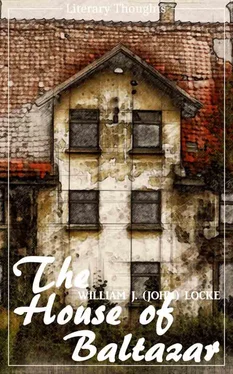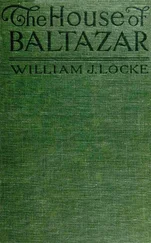“You can come for your lesson in an hour’s time.”
“In an hour precisely,” said Quong Ho.
“Have you prepared the work I set you?”
“With thorough perfection, sir.”
“You’ll be President of the Chinese Republic yet,” said Baltazar.
“It is no mean ambition,” said Quong Ho.
Baltazar took a book from his shelves devoted to general reading—an amazing medley of dingy volumes such as one sees only in an ill-arranged second-hand bookseller’s stock. It was a second-hand bookseller’s stock in literal truth, for Baltazar had bought a catalogue en bloc. It saved infinite trouble. The collection provided him with years of miscellaneous feeding. It contained little that was modern, nothing that was of contemporary moment; on the other hand, it gave him many works which he had ear-marked for perusal, hitherto in vain, from his boyhood. There were the works of Robertson—the Histories of Scotland, Charles V and America; Davila’s Wars in France; the Aldine Edition of the British Poets in many volumes; an incomplete Dodsley’s Old Plays; the works of one Surtees—he who wrote of the immortal Jorrocks and Soapey Sponge and Facey Romford; Elzevir editions of Saint Augustine and Tertullian; The Architectural Beauties of England and Wales; Livingstone’s Travels; and Queechy, by the author of The Wide, Wide World. A haggis of a library. No one but John Baltazar could have bought it at one impulsive swoop.
He took down the volume, almost haphazard, for it was his luxurious custom to devote after dinner a digestive hour to haphazard reading; a bound volume of pamphlets, which had once entertained him with the Times reprint of the Obituary of The Duke of Wellington. He sat down in his arm-chair, turned over some dreary pages, tried to interest himself in “What is it all About? or an Enquiry into the Statements of the Rev. C. H. Spurgeon that the Church of England Teaches Salvation by Baptism, instead of Salvation by the Blood of our Blessed Master Jesus Christ, and that Many of the Clergy are guilty of Dishonesty and Perjury, by the Rev. Joseph Bardsley, M.A.,” sadly shook his head, and, turning over more gloomy pages, came upon an oasis in the desert: “The Fight at Dame Europa’s School, showing how the German Boy thrashed the French Boy, and how the English Boy looked on.” He read the mordant sarcasm of eighteen hundred and seventy-one with great enjoyment, and had just finished it when Quong Ho, notebook under arm, entered the room.
“Quong Ho,” said he, “I’ve just been reading a famous satirical pamphlet on the part which England played in the Franco-Prussian War. When you have time you might read it. The English is impeccable. You won’t find any ‘adjunctives’ in it. It lashes England for not having gone to the help of France in 1870.”
“Why should one nation undertake another’s quarrel?” asked Quong Ho, with a curious flash in his eyes. “Why should China shed her blood for the sake, by way of illustration, of Denmark?”
“There is an answer, Quong Ho,” replied Baltazar, “to your astute question. In ancient times China and Denmark were as far apart as Neptune and Mercury. But wireless telegraphy has brought them to each other’s frontiers. Nowadays nations act and react on one another in a very subtle way. You must read a little more of modern European History, for Europe is the nerve centre of a system of nervous telepathy which forms a network round the earth. Nothing can happen in Europe nowadays without its sensitive reaction in China. You must remember that, at every instant of your life, if you wish to model a new China. For the old China has gone. I loved it, as you know, Quong Ho. But it’s as dead as Assyria. Another struggle between France and Germany would implicate the civilized world. Great Britain would not look on as in 1870, but would be on the side of France, and Japan would be on the side of Great Britain, and China——”
“Would throw her lot into the same scale as Japan,” said Quong Ho, demurely.
“Let us hope it never will happen,” said Baltazar. “In the meantime there’s something of greater importance.” He rose, went to his writing chair by the long deal table. “Let us see. What is it to-night? Elliptic Functions, isn’t it?”
And while John Baltazar, serene in his reading of political philosophy, was guiding Quong Ho through mazes of mathematical abstraction, German aircraft were dropping bombs about England.
THE renting of Spendale Farm, derelict for many years, caused some excitement on the moorland. It had achieved notoriety by concentrating in its small acreage every disadvantage that a farm could have. A soil so barren and granitic that scarcely grass would grow on it; a situation of bleakness unique in that bleak and unsheltered region; an inaccessibility almost beyond the powers of transport. The last was the final factor in the bankruptcy and despair of former tenants. Three miles of foot-and-wagon-worn track—and this now indistinguishable—must be traversed before striking a road, and along five miles of the road must one go before reaching the tiny town of Water-End, which contained the nearest railway station, shop, post office and church. Excitement grew in Water-End when motor lorries and materials and workmen from the cathedral town, thirty miles off, all made their daily way to Spendale Farm, and later, when packing-cases marked “Books, with the greatest care” were dumped on the station platform. All bore the name of John Baltazar—an outlandish name, if ever there was one, to eyes and ears of remotely rural England. And when the demented foreigner—for so they conceived him to be—was due to arrive in order to take up his residence, a fact proclaimed by the presence outside the station of Farmer Benstead’s old grey mare and springless cart which Ellis and Dean, the local estate agents, were known to have bought for the new-comer, the population of Water-End turned out to see what manner of being he was. The hefty, quickly moving Englishman, obviously the master, disappointed their anticipations; but the Chinaman, his coiled pigtail unconcealed beneath the brim of a bowler hat too small for him, made their eyes bulge with wonder. They did not even know he was a Chinaman until the vicar’s son, a lad of sixteen, unavowed emissary of a curious vicarage, gave them the information. Master and man drove off alone in the cart with their luggage, in the midst of gaping silence.
A Chinaman. What was a Chinaman doing in those parts? Men speculated in the bar parlour of “The Three Feathers.” Gossips of the more timorous sex discussed the possibility of a yellow peril—children kidnapped, throats cut, horrors perpetrated in lonely places. Mrs. Trevenna had seen murder in his eye; and Mrs. Trevenna, who had buried three husbands, was a woman whose opinion was respected. Mrs. Bates said his yellow hands were like the claws of a turkey-cock. Her daughter, Gwinnie, giggling, remarked that she wouldn’t like to have them round her neck.
“That’s what I’ve heard they do,” said old Mrs. Sopwith. “I remember my grandfather, him that was in the Indian Mutiny, telling me, when I was a little girl, that they thought nothing of strangling you. It was their religion.”
Thus the amiable Quong Ho leapt at once into a pretty repute—of which an addiction to Thuggee was a venial aspect.
But when, a few days afterwards, Quong Ho drove into Water-End on a shopping expedition, and in the presence of palpitating Water-Enders carried on his business and passed remarks on the weather, polite and smiling, in the easy English of the vicar and the motoring gentlefolk, with no perceptible trace of a foreign accent, they gaped once more in amazement. Language is a marvellous solvent of prejudice. No one who talked English like the Vicar could strangle English necks. But Quong Ho, unfortunately, complicated this favourable impression by overdoing the perfect Briton.
Читать дальше












